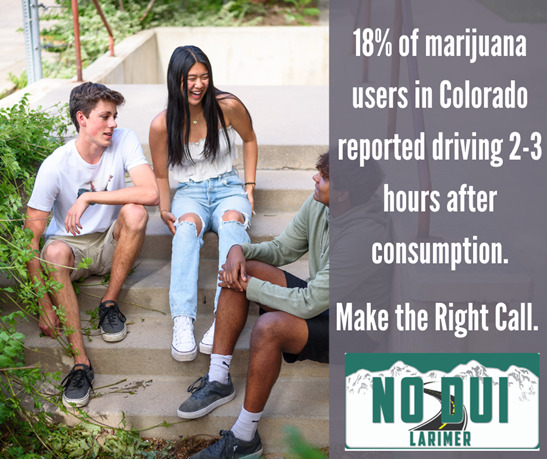Our parent nonprofit, Partners of Larimer County, receives lots of questions and feedback about cannabis use and driving, including: How high is too high to drive? Research shows that teens and young adults mostly do not perceive driving high to be as dangerous as driving drunk. However, recent studies and traffic fatality data show otherwise.
Impaired is impaired. Driving high can get you a DUI, just as driving drunk can. A BAC (Blood Alcohol Content) reading of 0.08 is the legal limit to drive in Colorado, although you can still get a DUI with a lower BAC if you show visible signs of impairment. So, when it comes to cannabis, how high is too high?

How high do I have to be to get a DUI for marijuana use in Colorado?
According to CDOT (Colorado Department of Transportation), “In Colorado, the main factor leading to a DUI arrest is the enforcement officer’s observation of impairment by the vehicle operator. If the officer determines that the driver’s ability to drive is impaired by alcohol and/or drugs [including cannabis] to the slightest degree, then an arrest can be made. One or more of the following specific factors can lead to an arrest:
- Observed impairment of the vehicle operator
- Initial traffic offense for which the operator is stopped
- Driver’s reaction to an officer’s command to stop
- Driver’s action while exiting the vehicle
- Performance during roadside standard field sobriety testing
- Results of any approved roadside testing device”
Medical marijuana cardholders can still be arrested for driving while impaired. Medical marijuana consumers are still expected to consume responsibly.
Does marijuana actually affect my driving?
Yes. In fact, a recent study showed differences in driving scores between sober drivers and those who had consumed marijuana even 3.5 hours post-consumption (Source: “Driving Performance and Cannabis Users’ Perception of Safety”) This is alarming, because, in the course of our work, we often hear statements from young people like, “Being high doesn’t affect my driving,” or, “I drive better when I’m high.”
How does marijuana impair driving?
Multiple independent studies have confirmed that marijuana impairs critical abilities needed to drive safely (Source: CDOT), resulting in:
- Difficulties in road tracking and maintaining lane position
- Decreased and divided attention
- Relaxed inhibitions
- Impaired cognitive skills, including route planning, decision making and/or risk taking
- Altered perception of time and distance
- Slowed reaction time
- Impaired cognitive performance
What happens if I get a DUI for marijuana-impaired driving?
The same DUI laws apply for marijuana as they do for alcohol, any other impairing substances, and any combination of substances. Fines range from $200-1,500 but can include other financial penalties and court costs. The average cost of a DUI in Colorado is $13,530.
As a safety-oriented organization, our greater concern is the risk of injury and even loss of life due to marijuana-impaired driving. We know that:
- Marijuana users were about 25% more likely to be involved in a crash than drivers with no evidence of marijuana use, however other factors – such as age and gender – may account for the increased crash risk among marijuana users. (https://www.cdc.gov/motorvehiclesafety/impaired_driving/impaired-drv_factsheet.html)
- Of seriously injured drivers admitted to trauma centers, more than 1 out of 4 tested positive for marijuana. (MADD Handbook: https://online.flippingbook.com/view/320259548/42/)
- With a population of about 344,000, Larimer County has over 4.5 times as many fatal accidents as Boulder, even though they have similar populations.
- 18% of Colorado marijuana users reported driving 2-3 hours after consumption. But participants in a 2022 cannabis impairment study had lowered driving scores even 3.5 hours post-consumption. (Center for Medicinal Cannabis Research at the University of California San Diego: https://jamanetwork.com/journals/jamapsychiatry/fullarticle/2788264?guestAccessKey=c31eeaa1-94d3-4f16-8f22-8ab39c92b3cb&utm_source=For_The_Media&utm_medium=referral&utm_campaign=ftm_links&utm_content=tfl&utm_term=012622)
- 7% of high school students in Larimer County self-reported driving after consuming marijuana in the past month. (Source: Healthy Kids Colorado Survey)
- In 2019, 47% of vehicle operators charged with DUI who were also screened for marijuana tested positive for Delta-9 THC. (CDOT: https://www.codot.gov/safety/impaired-driving/druggeddriving/campaign-news/how-high-is-too-high-to-drive)

As an impaired driving organization, we do not expect that teens and young adults will avoid marijuana or alcohol completely. Our goal is that as long as people are consuming alcohol, marijuana, and other drugs, they do so responsibly.
Follow No DUI Larimer on Facebook, Instagram, and Pinterest for more ways you can combat impaired driving in our community.

![Partners [Logo Reversed]](https://poweredbypartners.org/wp-content/uploads/2020/06/partners-horiz-no-tag-sm-rgb-color-purple.png)